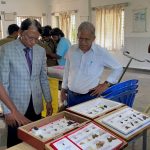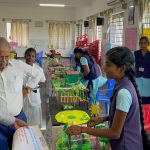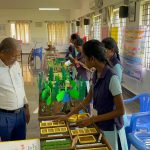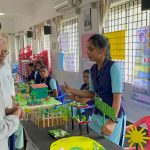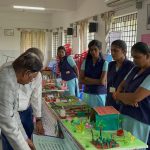A report on Agricultural Exhibition program of Rural Agricultural Work Experience (RAWE) for students
Title: Agri Expo – 2025
Venue: AV hall, School of Agriculture, PRIST
Date: 23rd May 2025
Organized by: Final year students, School of Agriculture, PRIST
Introduction
The Agricultural Exhibition – RAWE 2025 [Rural Agricultural Work Experience (RAWE)] was organized to showcase the latest advancements in agricultural technologies, farming equipment, sustainable farming practices, organic farming, and agro-based industries, post the RAWE programme of 2021 batch admitted students. The exhibition provided a common platform for farmers, agricultural scientists, students, entrepreneurs, and agribusiness stakeholders to share knowledge, innovations, and market trends in agriculture.
Objectives
- To create awareness about modern agricultural technologies and practices.
- To promote interaction between farmers and agricultural experts.
- To display high-yielding and pest-resistant crop varieties.
- To provide information on government schemes and subsidies.
- To encourage agribusiness start-ups and innovations.
Major Highlights
- Inaugural Ceremony:
The program was organized with the blessings and motivation of Hon’ble Chancellor Mr. M. Ponnaiyah Nageshwaran, marking the beginning of a knowledge-rich session. Hon.Vice-Chancellor Dr. T. V. Christy, during his inaugural address, motivated students and faculty to pursue projects aimed at supporting the farming community. Dr. Venkata, Chief Executive Officer, reaffirmed PRIST Deemed to be University’s commitment to agricultural education and its encouragement of student-led innovations. Dr. M. Abdul Ghani Khan, Registrar, informed students about the various government subsidies available in the agriculture sector. Dr. D. Jayakumar, Dean, emphasized the importance of integrating academic research with field-level applications to empower rural development. Mr. N. Ilanchezhian, External Member, also graced the occasion and appreciated the university’s efforts in promoting practical, community-oriented learning. Faculty members of the School of Agriculture led by the HoD had made elaborate arrangements for hosting the event.
- Stalls and Exhibits:
- Over 50 stalls showcased advanced farm machinery, organic farming tools, precision agriculture technologies, and climate-resilient crop varieties.
- Live demonstrations of drone spraying, vertical farming systems, and smart irrigation methods were held.
- Workshops and Technical Sessions:
- RAWE students conducted sessions on ‘Integrated Pest Management (IPM)’, soil health management, and post-harvest technologies.
- Compost preparation, beekeeping, mushroom cultivation, and greenhouse farming concepts were demostrated.
- Government Schemes and Farmer Services:
- Information desks provided guidance on PM-KISAN, crop insurance, MSP procurement, and soil health cards.
- On-the-spot registration for farmer welfare schemes was facilitated.
Conclusion
The Agricultural Exhibition Program was a thumping success and achieved its objective of educating and empowering the participants. It fostered collaboration among various stakeholders and encouraged the adoption of modern, sustainable agricultural practices. Such events play a crucial role in boosting rural development and enhancing agricultural productivity.


